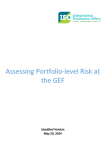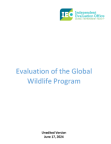Policy coherence, as defined in Global Environment Facility (GEF) documents, refers to "the systematic promotion of mutually reinforcing policy actions across government departments and agencies, creating synergies towards achieving the agreed objectives." Enhancing policy coherence has the…
Assessing Portfolio-Level Risk at the GEF
The Global Environment Facility (GEF) aims to embrace more calculated risks in its efforts to achieve transformative environmental outcomes. Currently, the GEF portfolio has a low to moderate risk profile. The majority of projects in the portfolio are categorized as low-risk and have generally…
Assessing Inclusion of Marginalized Groups in GEF-Supported Projects, with Attention to Fragile and Conflict-Affected Situations
This evaluation will examine whether, how, and to what extent projects supported by the Global Environment Facility (GEF) are inclusive of historically marginalized groups, and the effects of inclusion (or lack thereof). It will focus on inclusion of people marginalized on the basis of gender (…
Evaluation of the Global Wildlife Program (GWP)
This evaluation assesses the effectiveness, relevance, coherence, and results of the Global Environment Facility (GEF) supported Global Wildlife Program (GWP). It examines the program's performance in supporting wildlife conservation efforts through ongoing and recently completed GWP projects.…
Inclusion 2024 Audit Trail Reference Group
Inclusion 2024 Meeting Minutes Reference Group
Inclusion 2024 Approach Paper
This evaluation will examine whether, how, and to what extent GEF-supported projects are inclusive of historically marginalized groups—in particular people marginalized on the basis of gender (with a primary focus on women, but also girls and sexual and gender minorities), Indigenous Peoples and…



